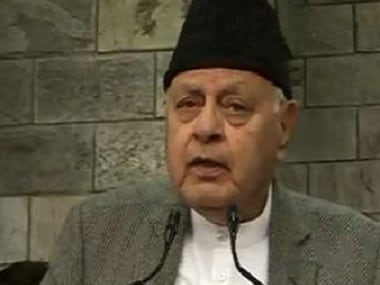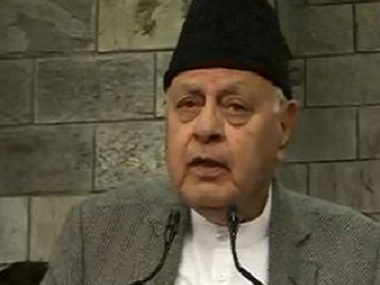The situation in Jammu and Kashmir has been a prominent topic of debate in India and across the globe, especially since the Narendra Modi government scrapped the provisions under Article 370 in August.
Even as lack of information on the ground situation in the Valley eludes most of us, reports have said that several Opposition leaders , separatists and political activists are currently detained. In an exclusive report in The Indian Express, since 5 August, as many as 4,000 people have been detained in Jammu and Kashmir. The report clarified that there was no official count, but under Public Safety Act almost 300 have been detained under the draconian law. However, the restrictions imposed in the Valley made it impossible for legal recourse, and therefore barely a dozen habeas corpus petitions challenging the detention and asking the government to produce the detainee in court have been filed. Jammu and Kashmir National Conference chairman and former chief minister Farooq Abdullah — one of the top voices from the Valley held in Srinagar since the beginning of the clampdown — was on Monday further detained under the Public Safety Act. The Hindu quoted a senior official as saying that Abdullah would initially be detained for 12 days after which the officials could seek extension for another three months if the situation demanded so. The detention of him and other leaders raises many questions as to what are the laws on preventive detention in the Constitution and what are the options available to the detainees.
Grounds for preventive detention
There are various laws under which a person can be detained. In case of preventive detention, while certain Acts list grounds for the detention, some don’t. An example of preventive detention without grounds is the power the police have under the Code of Criminal Procedure (CrPC). Under the CrPC, a police officer can detain any person for 24 hours, after which he will have to be produced before a judge. The police will have to make an allegation against the detainee before the judge, otherwise the police can detain anyone for 23 hours and then release them. [caption id=“attachment_6357601” align=“alignleft” width=“380”]  File image of Farooq Abdullah. ANI[/caption] Preventive detention is not a form of punishment but is to rather allow the authorities to prevent a person from doing something that may be prejudicial to the State. The grounds on which a person can be kept under preventive custody are: security of the state, public order, foreign affairs, and services essential to the community. Though an Act can pronounce the multiple grounds under which a person can be detained, Article 22 says a person need not be informed about the ground of his or her detention if public safety or security requires it.
Safeguards under preventive detention
After a person has been in preventive detention for three months, the case has to be brought before an advisory board which is constituted to review the detention. Apart from this, there are also other safeguards like allowing a detainee to go for legal remedies. However, the Constitution also allows the authorities to put someone, particularly a person they deem an ’enemy alien’, under preventive detention without these safeguards. This has often been criticised for being in violation of the individual’s liberty and fundamental rights.
The habeas corpus recourse
While a person can seek bail when he has been kept under regular detention, someone under preventive detention only has the remedy of a habeas corpus up to those three months. According to The Indian Express between 14 February (Pulwama attack) and 4 August as many as 150 habeas corpus petitions were filed in the Srinagar bench of the Jammu and Kashmir High Court. In almost 80 percent of the cases (verdict came in 39 of these cases), the court ordered the release of the detainee. All these pleas involved those booked under the PSA. Ajay Kumar, an advocate practising at the Bombay High Court, calls habeas corpus “the single-most important Constitutional remedy in existence” because it’s a procedural review and any person can move it to review the detention of anyone. He explains, “In habeas, you cannot ideally say ‘I’m being detained without adequate evidence; that’s a substantive review. A habeas is a procedural check. What a detainee can say is the officer who was to sign the order has not signed, they’ve got his name and address wrong, etc, or there was no application of mind. “Rather than arguing that the evidence is poor, the detainee must argue that the conclusion to detain couldn’t have been reached from the evidence on record. In preventive detention, the courts ideally don’t go into the government’s judgement of whether there is a credible threat or not, but generally tend to defer to the government’s judgement on this.”
The terms of detention
According to the law, thestate government can detain a person on the terms that they deem fit in a bid to prevent them from committing a cognisable offense. The district magistrate (DM) is authorised to pass the order with the terms for the detention. The terms, however, cannot be punitive and the detainee can file an application for certain demands. Kumar explains, “Even if they put me (any person) in a regular jail, I can demand my constitutional rights and say that I’m not here because I’m punished but because I’m here on a preventive custody basis. So he has a right to be treated better than a convict serving a sentence. He can ask for things like home food, newspapers, a radio etc. “In this case, he can apply to the the authority setting the terms of the detention. If the authority refuses to allow it, then they have a cause or action to approach the high court or the Supreme Court saying that fundamental rights are being violated. And then the government will have to show how denying them these rights are in the national interest.”
The question of Abdullah’s detention
According to reports, Abdullah was on Monday booked under the ‘public order’ provision of the PSA, and his house was declared as a subsidiary jail. Under the said provision, the 83-year-old can be detained from three to six months without a trial. There are provisions under the PSA which also allow one to be detained for up to two years without a trial, which make the Act all the more controversial. The question is, since Abdullah had already been detained since 5 August, what prompted the authorities to now book him under the PSA? The National Conference on Monday said the party would take legal course to challenge the detention of its president. “They have no justification to do that, but if they have booked him under the PSA, then we can only approach the courts. We will take constitutional and legal recourse,” senior party leader Mohammad Akbar Lone told reporters in Srinagar. Meanwhile, the Supreme Court on Monday directed the Centre and the Jammu and Kashmir administration to respond by 30 September to MDMK leader Vaiko’s plea which has sought that Abdullah be produced before the court. A bench of Chief Justice Ranjan Gogoi, and justices SA Bobde, and SA Nazeer issued the notices after Vaiko’s counsel told the apex court Abdullah had been illegally detained by the authorities. Amnesty India even took on the Modi government on Twitter:
A detention order was passed against Abdullah, who has allegedly been under house arrest since Aug 5, for ‘disturbing public order’.
— Amnesty India (@AIIndia) September 16, 2019
The continuation of draconian laws against political dissidents despite promises of change signals a dishonest intent on part of the Indian Govt.
Interestingly, all of this comes over a month after Home Minister Amit Shah — during a Lok Sabha debate on motion to abrogate provisions of Article 370 — claimed that Abdullah was neither under detention nor under arrest. “He is at his home on his own will,” he had said, when speculations were on about the security build-up in the state. On 14 August, Shah Faesal, the Kashmiri IAS topper who quit the civil services to join politics, was also detained under PSA after he was sent back to Kashmir from Delhi airport. With inputs from agencies


)

)
)
)
)
)
)
)
)



